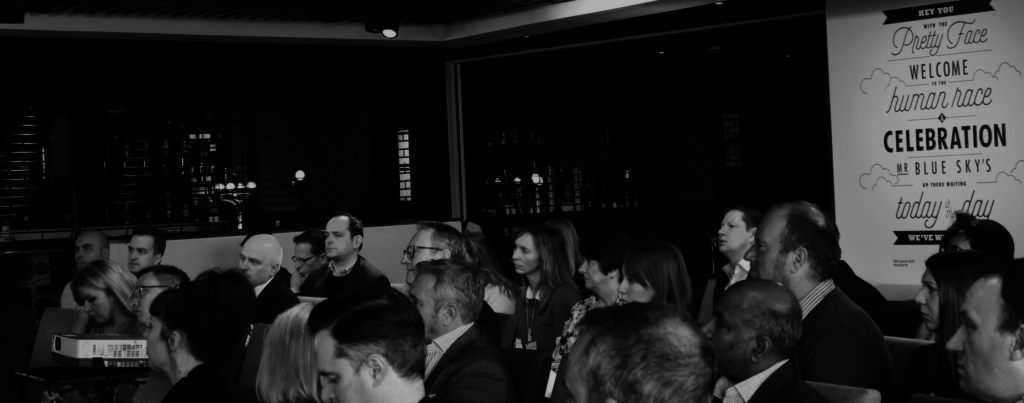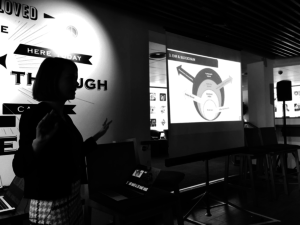Business leaders and digital innovators in the health and technology sectors met at First Direct Arena on 1st March for HealthTech North.
The focus of the event, hosted by Whitecap Consulting and Spread Innovations, was on the current challenges and opportunities involved in health technology space and how businesses can best position themselves to work with the NHS.
Julian Wells of Whitecap opened the event and introduced the four keynote speakers who shared their knowledge and insight with the delegates. We’ve summarised the morning’s proceedings below.
UK economic outlook & the health sector
Beckie Hart, Regional Director of the CBI, opened the event with a fact-filled overview of the post-Brexit UK economy – which she explained is still looking strong, even with the much discussed drop in the sterling (the CBI expect the pound to continue to be volatile for the near future). It was also noted that we can expect inflation to increase and this is likely to squeeze consumer spending as wage inflation is not likely to increase to the same level.
Beckie explained that CBI members working in the NHS specifically report ongoing challenges with the commissioning landscape, which is complex to navigate with multiple clinical commissioning groups to sell goods and services to. It is also particularly challenging to scale up successful and proven innovations within the NHS as the commissioning landscape across the country is so fragmented.
The CBI is engaging with the NHS on plans for a new procurement model for goods and services (Future Operating Model) and sharing the intelligence with its members on upcoming changes as well as reflecting supplier views directly to NHS procurement.
You can view Beckie’s presentation slides here.

The challenges of working with the NHS
Mike Farrar, Chief Executive of Spread Innovations and ex-NHS Confederation CEO, was up next and shared some fascinating insights around the way the NHS works. He highlighted his concern in a forecast that by 2020, we expect a £30 billion gap between NHS income and demand for healthcare. He voiced other concerns on slipping standards and unmet targets. Mike then moved on to why the NHS is challenging to work with – in particular the long decision making time, different layers of stakeholders, and multiple decision makers.
Mike explained how we should face these issues, firstly by examining what other industries would do in this situation. He outlined three factors other industries tend to examine:
- Consolidate – by focusing on increasing efficiency.
- Unit costs of delivery – can we get more productive? The NHS is very labour intensive – how can we help our staff be more productive?
- Pull in innovation – digitise processes, go for best value products rather than just short term cost saving, look at tools revolutionising the sector.
Mike finished off by stating that service providers should communicate how solutions align with the values of the NHS and gain advocates for the solutions in the right health circles.

Digitally enabled product innovation
The next speaker was Victoria Betton of Leeds-based innovator mhabitat, who introduced a more digital angle to the event as she spoke about her work helping digital providers get into the health space.
Victoria said we spend a lot of time talking about the development of tech solutions and ‘throwing them over the fence’, only to see them not get adopted by the end users, when in fact more focus is needed on areas of adoption with the end users of the product. She highlighted that products that have been developed in collaboration with the ends users have a much better chance of being implemented.
Victoria then took us through various tips for positioning yourself more successfully for NHS buy-in, echoing Mike’s sentiments about highlighting the need to communicate the end value and outcome of the product, rather than the tech itself – “It’s less about pitch and sell, more about aligning values”. Victoria finished her talk on ‘false innovation’, with a hard hitting home truth that throwing tech pixie dust solutions over larger systematic issues and flawed processes will not help solve an issue.
You can view Victoria’s presentation slides here.
Blockchain and the role of cryptography
 The last speaker, Laura Bailey of Zerado, went further down the technology road by introducing blockchain and its use in healthcare. Zerado is a technology agnostic consultancy with no bias towards a firm or brand, whose purpose is accelerating the transformation of society through technology.
The last speaker, Laura Bailey of Zerado, went further down the technology road by introducing blockchain and its use in healthcare. Zerado is a technology agnostic consultancy with no bias towards a firm or brand, whose purpose is accelerating the transformation of society through technology.
Laura explained that blockchain has huge potential to transform health databases, but progress may be slow because of a lack of knowledge around the technology. She also highlighted that it is important to understand what the requirement is, and that it can sometimes be better to build less complex tech layer than to use blockchain.
After telling delegates that blockchain “seems like magic” to many people, Laura explained that it is made up of three technologies: cryptography, databases, and peer-to-peer. Having explained some of the tech, she moved on to talk about where blockchain could advance the sector, namely in electronic health records, and highlighted the crucial need for data security in newly digitised and advanced patient health databases.
You can view Laura’s presentation slides here.
Panel Q&A
 HealthTech North closed with a lively Q&A panel which was chaired by Mark Chamberlain, Director of Spread Innovations and Associate at Whitecap Consulting. The debate zoned in further on the speakers’ topics particularly including working with NHS procurement and how to present and communicate your solution to the NHS, with delegates sharing their own personal experiences from their dealings with the NHS.
HealthTech North closed with a lively Q&A panel which was chaired by Mark Chamberlain, Director of Spread Innovations and Associate at Whitecap Consulting. The debate zoned in further on the speakers’ topics particularly including working with NHS procurement and how to present and communicate your solution to the NHS, with delegates sharing their own personal experiences from their dealings with the NHS.
Richard Coates, Managing Director of Whitecap Consulting, joined the speakers for the panel session, and shared his observation that many of the issues discussed throughout the morning resonate with the strategic challenges Whitecap sees across its client base, whilst also acknowledging the NHS environment is a particularly challenging one.
In summary, HealthTech North was a great opportunity to open up some insightful conversations around how businesses with digital and tech solutions could work with the NHS. Whitecap Consulting and Spread Innovations would like to thank all who attended, and in particular the speakers for their expert and thought-provoking presentations.
Whitecap’s next event, Fintech North will be happening on 26th April 2017. Hosted at aql in Leeds as part of the Leeds Digital Festival, this showcase event provides keynote speakers discussing topics such as alternative finance, big data and analytics, machine learning and exporting UK FinTech. You can read more details about Fintech North here, or alternatively register here.
